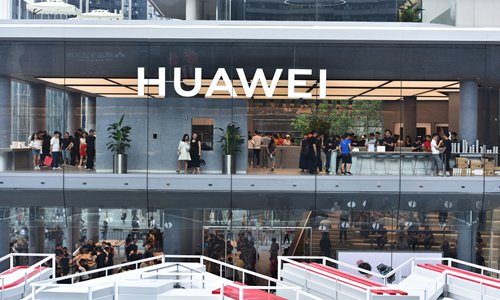HOME >> BUSINESS
Huawei sees faster revenue growth in first three quarters of 2019 despite US ban
By Chen Qingqing in Zurich and Chu Daye in Beijing Source:Global Times Published: 2019/10/16 20:53:40 Last Updated: 2019/10/16 23:45:30
Revenue growth speeds up from Jan-Sep

People shop at Huawei's first flagship store in Shenzhen, South China's Guangdong Province. Photo: IC
Huawei shipped more than 185 million smartphones in the first three quarters of 2019, up 26 percent year-on-year, despite a US ban that hurt its ties with US suppliers, the company said in financial results released on Wednesday.
The Chinese technology giant said revenue grew 24.4 percent to 610.8 billion yuan ($86.2 billion) in the face of the US crackdown, especially a ban that affected its cooperation with major US-based suppliers such as Google and Intel.
As the commercial deployment of 5G networks around the world has sped up, Huawei has signed more than 60 commercial contracts for 5G with global carriers and shipped more than 400,000 5G base stations to global markets, the company said.
It also said that its mobile ecosystem has developed rapidly, attracting 1.07 million registered developers worldwide.
Yi Beichen, a veteran mobile internet observer, told the Global Times on Wednesday that Huawei's performance amid the unfavorable conditions such as rising uncertainty showed the company's resilience as well as the effectiveness of its diversification strategy.
The consumer business accounted for more than half of the group's total revenue in the first three quarters, indicating the success of its dual-branding strategy for its smartphones and its dominance in the Chinese, Southeast Asian and European markets, Yi said.
After the US put Huawei onto its Entity List in May, which partially banned Google from supplying Android services to Huawei, the Chinese company released its self-developed operating system HarmonyOS in August as plan B to deal with the barriers to supply.
The company's optimization and restructuring work also made tangible progress following the crackdown by the US government, Yi said. "The US move to associate the company with the trade war between the world's two largest economies gave Huawei the most compelling advertisement, and there is also enhanced cohesion inside the company."
"The financial results, which provide promising results, showed that the company has recovered from the initial impact brought of the US ban," Fu Liang, a Beijing-based telecom industry expert, told the Global Times on Wednesday.
"The negative was strongest in the second quarter. In the third quarter, what we saw was that the job of fixing holes in Huawei began to yield results," noted Fu.
The company is expected to debut the smartphone version of the HarmonyOS on its flagship P40 smartphone, which is to be launched in early 2020.
HiSilicon, the in-house semiconductor and integrated circuit design company operated by Huawei Technologies, said it has begun selling its 4G chip, the Balong 711, on the open market as demand for internet-backed solutions continues to surge.
Newspaper headline: Huawei rebounds from US pressure